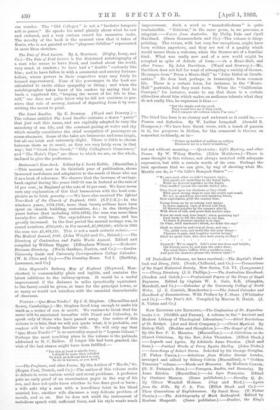PODYDY.—Quo Musa Tenclis ? By J. K. Stephen. (Macmillan and
Bowes, Cambridge.)—Mr. Stephen lived long enough to make his mark as a writer of vers de societe. We venture to think that his name will be associated hereafter with Pramd and Calverley, to speak only of those who have passed away. Our notice of this volume is so late, that we will not quote what, it is probable, our readers will be already familiar with. We will only say that "Quo Musa Tendis ?" is no unworthy sequel to " Lapsus Calami." Perhaps the most touching piece in the volume is the palinode addressed to H. C. Raikes. If longer life had been granted, the wish of the last stanza might have been fulfilled :— " For this at least is wholly true;
I should be more than satisfied To work as well and hard as you. To die in harness, as you died."
—The Professor, and other Poems. By the Author of " Moods," &c. (Kegan Paul, Trench, and Co.)—The author of this volume seeks to debate in verso various social and moral problems. A professor puts an early proof of an examination paper in the way of his son, and does not quite know whether he has done good or harm ; a wife asks why a man with a hereditary taint in his blood married her; another wife discusses a very delicate problem of morals, and so on. But he does not wield the instrument of melodious speech with sufficient force, and his style wants much improvement. Such a word as " numskulledness " is quite inadmissible. " Solicism," in the same poem, is, we presume, a misprint.—Voices from Australia. By Philip Dale and Cyril Haviland. (Swan Sonnenschein and Co.)—The volume is disap- pointing. The verses, with but very few exceptions, might have been written anywhere, and they are not of a quality which would secure them a welcome, when the themes are of a familiar kind. What was really new and of a new world might be accepted in spite of defects of form.—In a Music-Hall, and other Poems. By John Davidson. (Ward and Downey.)—Mr. Davidson does not fail for want of attempting a variety of themes. He ranges from" From a Music-Hall" to "John Baliol at Strath- cathro." He does best, perhaps, in transcripts from common life. There is a certain force, for instance, in the " Music- Hall " portraits, but they want form. When the "Californian Comique," for instance, wants to say that there is a certain attraction about him which makes an audience tolerate what they do not really like, he expresses it thus :— "But the simple and the good, They would hiss me if they could,
But I conquer all volition where I'm seen."
The third line here is as clumsy and awkward as it could be.— Passion and Reflection. By W. Luther Longstaff. (Arnold B. Hampson.)—We have here fluent verse, with a touch of passion in it, too gorgeous in diction, for the ornament is thrown on somewhat recklessly, as in- " Pillars up-builded of million on million Diamonds set in a lurid vermillion," but not without meaning.—Quatrains: Life's Afystery, and other Poems. By W. Wilsey Martin. (Elkin Matthews.)—There is some thought in this volume, not always matched with adequate expression, but with a certain worth of its own. Perhaps the beet specimen that we can give, by way of showing what Mr. Martin can do, is "On Life's Banquet Stairs" :— "We pass each other on Life's banquet stairs New guests arc mounting to the festal light, While we descend together to the Night, Close muffled 'gainst the outbid° wintry airs.
They tread upon our shadows as they climb With quick strong' steps to join the crowd and crush. We see, in sparkling eyes and speaking blush, How expectation gilds the coming time.
Young forms go by us tossing rosy sprays In bravo apparel, tints of newer and bird,
Of blossom-patches by the summer stirr'd, With sheen of silk, and gems that scatter rays.
Knew we such zest, true heart I when mounting up P Such haste to lift the chalice to our lips,
To learn if pleasure sweeter is in sips,
Or when, with manhood's thirst, we drain the cup P Shall we stand by and carp at these, and say—
Go, giddy ones, and moth-like fire your wings— Pleasure is pain, and laughter sorrow brings,' Shall we speak thus, who once were young as they ?
Farewell! We've onpp'd. Life's wino was keen and bright;
Old friends move by and gain the outer door ; The wind blows buffets with a northern roar, And past the shadows gleams the distant light 1"
Of Periodical Volumes, we have received :—The Baptist's Hand- book and Diary, 1893. (Veale, Chifferiel, and Co.)—Transacturns of the Royal Historical Society. New Series, Vol. VI. (Longmans.) —Clergy Directory. (J. S. Phillips.)—The Australian Handbook. (Gordon and Gotch.)—Professional Papers of the Corps of Royal Engineers. Edited by Captain W. A. Gale, R.E. (Simpkin, Marshall, and Co.)—Calendar of the University College of North. Wales. (J. E. Cornish, Manchoster.)—The School Calendar and Handbook of Examinations. With Preface by F. Storr. (Whittaker and Co.)—The Year's Art. Compiled by Marcus B. Huish. (J. S. Virtue and Co.)


































 Previous page
Previous page